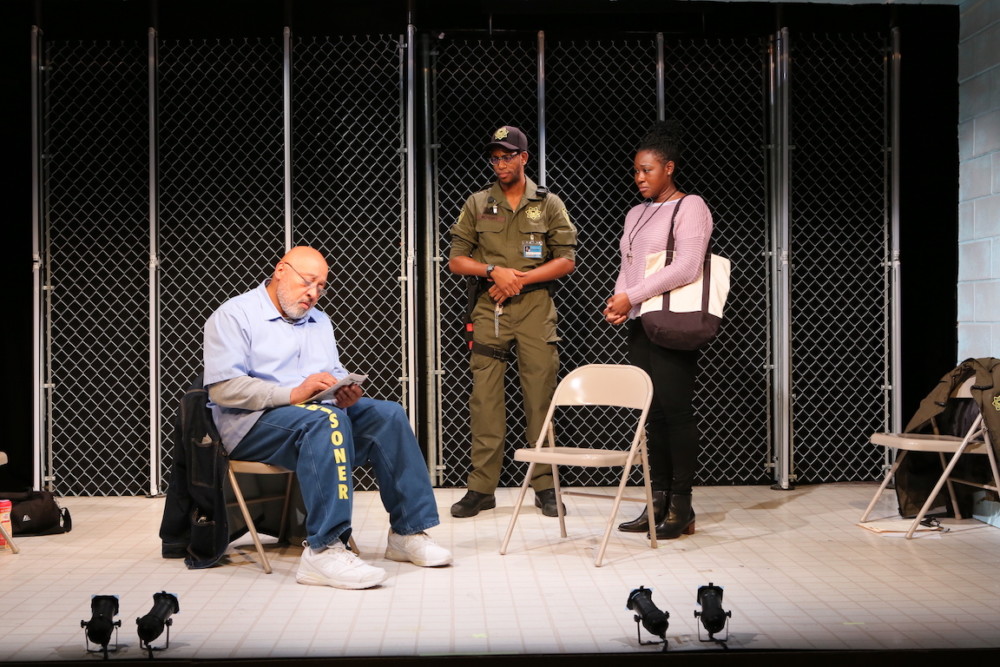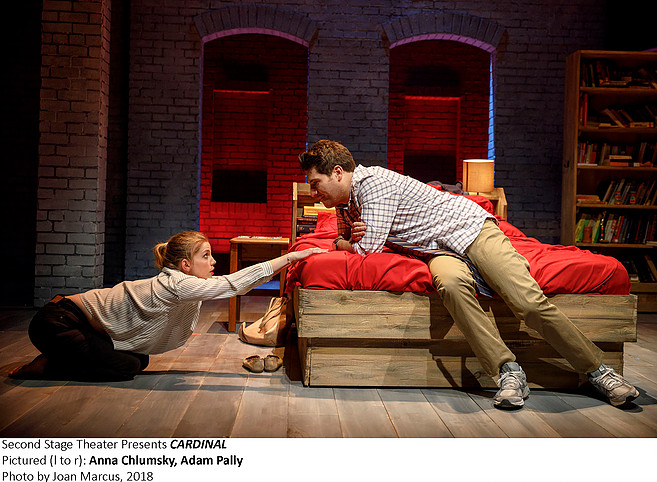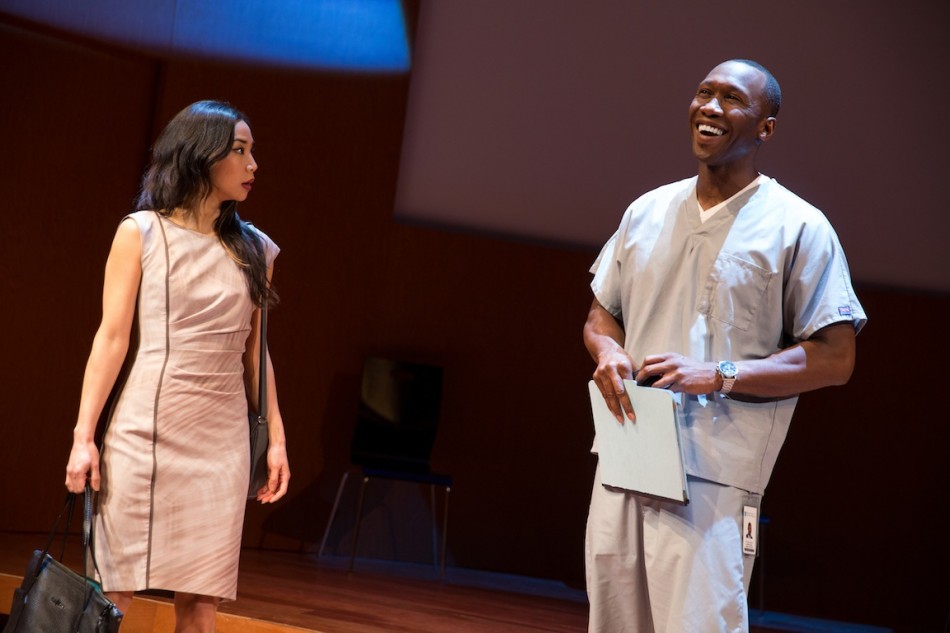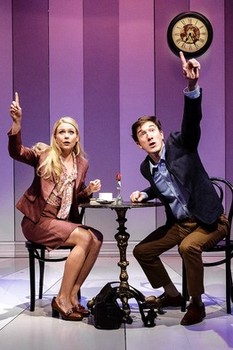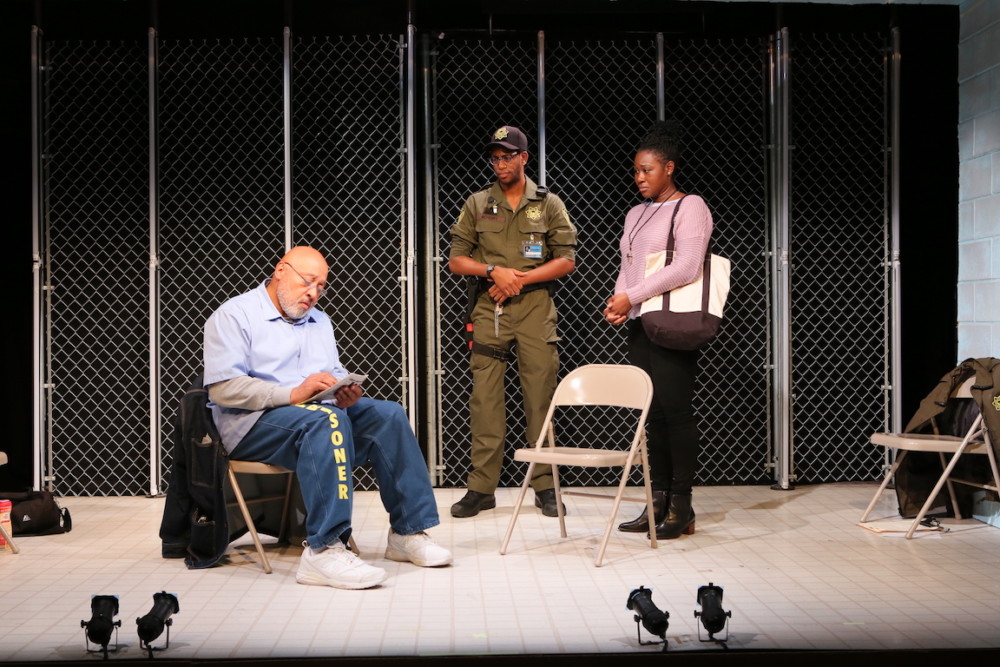
Keith Randolph Smith, Eric Berryman, and Zenzi Williams
By Samuel L. Leiter
As her well-performed new play, Lockdown, demonstrates, playwright Cori Thomas is deeply committed to using theatre as a way of helping to bring about reform in the American prison system. In addition to Lockdown, she’s been collaborating on another play with Lonnie Morris, a San Quentin State Prison prisoner incarcerated for 42 years; she’s also on the board of No More Tears, a San Quentin group dealing with issues of recidivism and re-entry. Thus one can be forgiven for thinking Lockdown has at least a few semi-autobiographical underpinnings.
Lockdown, tightly directed by Kent Gash, focuses on four African-American characters. The two principal ones are Ernest (“Ernie”) Morris (Zenzi Williams, School Girls) and Wise (Keith Randolph Smith, Jitney). Ernie’s a professional writer, quirkily named for her grandfather, who volunteers to help at an unnamed prison. Wise (a nickname) is a 62-year-old convict, imprisoned for 46 years since killing a police officer during a robbery when he was 16.
During his many years in prison, the self-educated Wise has turned his life around, gotten a degree in sociology, and become an inspirational leader and mentor for other prisoners on how to better themselves. He teaches them how they can succeed when they leave prison so they don’t find themselves coming back through recidivism’s revolving door.


Curt Morlaye-Williams
But for all his saintly charm and natural eloquence, Wise has gone before the parole board 13 times without convincing it to release him, or to earn the forgiveness of the slain cop’s still angry family. Each failure means he may have to wait as long as five years before getting another shot.
Ernie, for her part, has written a book so successful Wise has not only read it but memorized key passages. Thinking her name is that of a man, Wise is amazed to discover not only that his new assistant wrote his favorite book but that she’s a woman. (Thomas tries hard to avoid accusations of contrivance by giving Ernie an opening speech about “synchronicity.”) And he wants her to help him prepare for his next parole hearing.
Mired in writer’s block, Ernie perhaps hopes to find motivation in what she learns about the penal system. The script offers many details on prison life, like how autotrophically tiny Wise’s cell is when it’s revealed behind the steel mesh fence forming the rear wall of Jason Sherwood’s efficient set. It also provides the minutely detailed list of rules Ernie receives from the officious corrections officer or C.O. (Eric Berryman, smartly done) about how to behave. This young, tense C.O., on the job for only eight months, is ready to pounce on the slightest infraction and send the perpetrator to “the hole.” Even a spontaneous hug between Ernie and Wise earns an alert.
Ernie’s also wrapped in a web of emotional difficulties stemming from the heart-attack death three years before of her husband. Sitting in her room at one side, she continues to replay his last recorded voicemail message. The play thus opens its metaphorical metal bars so that the emotional ones keeping Ernie in her emotional lockdown reflect the prison’s physical ones, which appear at any sign of trouble.
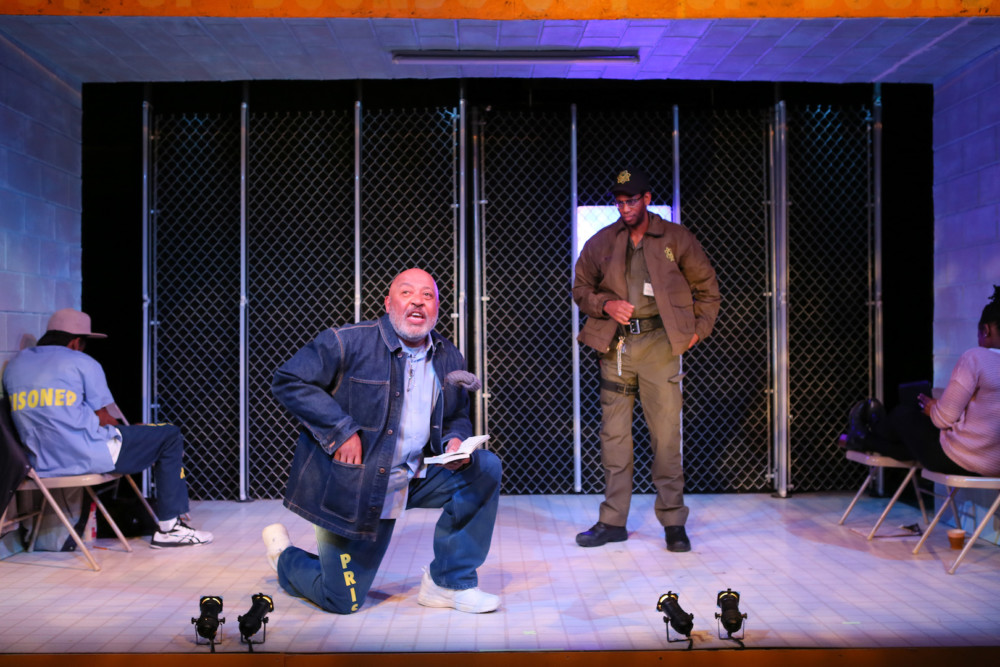

Keith Randolph Smith, Eric Berryman
Lockdown also attempts to show the vulnerable sides of the uptight C.O. and another prisoner, the troubled, young, would-be rapper, Clue (Curtis Morlaye-Williams). Thomas avoids the kind of hardened criminals and sadistic guards so typical of prison dramas.
Despite hoping to inspire understanding and discussion of our country’s prison dilemma (post-show talkbacks with invited guests are a regular feature), Lockdown is essentially preaching to the choir about what they already know from countless films and TV shows, like “The Night Of” or “Orange is the New Black.” The chief problem presented is how difficult it is for someone—even a well-spoken, aging, model prisoner—to earn parole. No answers are provided, though; even the one attempted fails.
Making the play as much about the writer’s personal issues as those of the prisoners is problematic and tends to split the play’s focus. Thomas also relies too heavily on monologues spoken directly to the audience. Fortunately, Zenzi Williams’s Ernie demonstrates a potent stage presence that knows how to wring meaning and emotion from each line and response, while Keith Randolph Smith is so charismatic, with his fears, tears, guileless smile, and huge voice, he’s almost too powerful for his own character.
If you’re going to spend 95 minutes in the theatrical equivalent of the hole, I can mention far more punishing plays at which to do so at than in lockdown with this crew.
Lockdown. Through May 19 at Rattlestick Playwrights Theater (64 Waverley Place, at MacDougal and Washington Square West, Greenwich Village). 95 minutes, no intermission. www.rattlestick.org
Photos: Sandra Coudert


